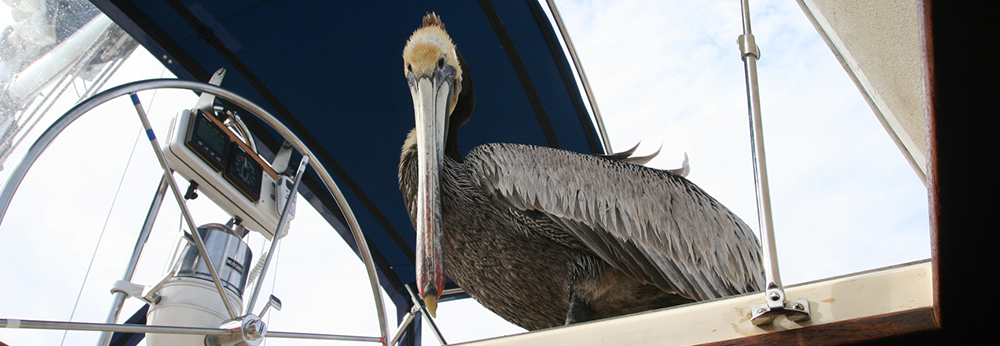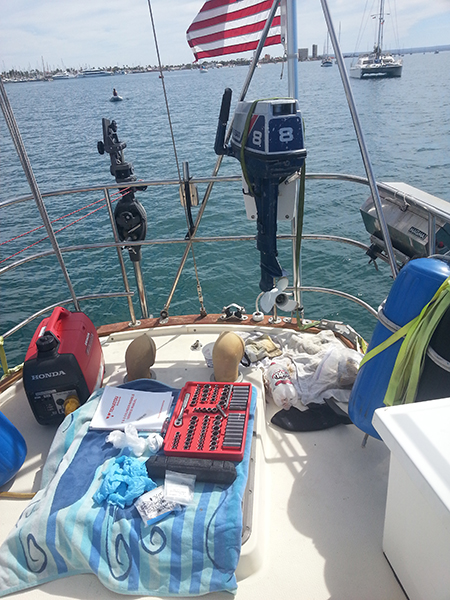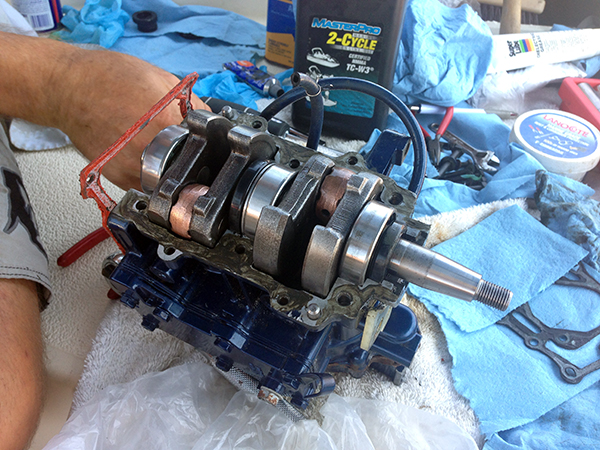It wasn’t until we left Moss Landing that we realized how much we would be relying on Peanut (our dinghy). Orion takes us from region to region but Peanut takes us to all the places we want to go once we are somewhere – to the beach, to town, to visit other boats, to that little island three miles to the east. She’s like our car. When our car breaks down we walk or take a bus, the slow modes of getting there. When Peanut’s motor breaks down the slow mode is to row. Good exercise but very limiting on distance. So when her motor stopped working everything else dropped off the ‘to do’ list.
It seems that every motor problem has a hero. Sergio saved Orion’s exhaust manifold and now Guillermo saved Peanut’s crankshaft. Guillermo is a large greasy mechanic who wears lopsided flip flops while welding large chunks of metal in his densely packed backyard workshop. When walking the narrow winding path that leads from the road to his workshop I noticed four engines in different states of disrepair, a number of outboard motors laying every which way, half a panga, two rusted out full size vans, a motorcycle, an engine lift that may work, a street vender’s cart labeled ‘Hotdogs’, laundry hanging to dry and a fire pit with a boiling hunk of meat stewing in a kettle. It’s an intimidating scene. It took ten minutes to get the nerve up to go through the hole in the chain link fence and walk to the backyard. I even left and rode a block and a half away before I made myself go back. But I need to get this crankshaft fixed and supposedly, “Guillermo es el hombre.”
I have been running around all day trying to come up with a way to replace a blown crankshaft seal. Yesterday, I tried threading a new seal spring where the old one had broken but the space is too tight to pull, twist and lock it. My buddy Franz and I sat around and came up with some creative solutions like wrapping the seal in tape and pressurizing it with silicon glue which would hold the seal against the shaft once dry yet still have some flexibility. We discussed cutting a piece of plastic to the perfectly exact right size and slipping it on like a split ring. Not likely. And my favorite, tying a piece of wet leather inside the seal that, as it dried, would clamp the seal against the shaft. But before putting any of these ideas into action what I really wanted was to fix the problem correctly; pull the shaft apart, replace the seal and put it all back together.
A few folks I talked with explained that, “Crankshafts have super tight tolerances, if you don’t get the parts aligned right it’ll vibrate the motor to pieces. You need a special jig to get it right,” and the general consensus was that no one around here has one. A depressing prospect because without the seal the motor only half works. But this is Mexico, people don’t throw motors away just because a seal goes out, someone in La Paz knows how to do this and I was going to find him.
With the crankshaft on my back I rode our folding bike into the depths of La Paz to play twenty questions with the locals. I find that if I ask twenty questions I can understand the answer to seven which is enough to get something done. First stop, the bearing and seal shop. Ten questions in and Juan and I were looking at photos of his last fishing trip to Bahia de Los Angles (Bay of Los Angeles). He caught some big fish and had a blast with his family camping and swimming. I love this about Mexicans, they always have time shoot the shit. In the US most folks go too fast to pause and say hi for a few minutes in the middle of a work day. At fifteen questions I had a lead. “Manuel can change out that seal. Go five blocks and turn left at the closed down McDonalds. Then eight or ten blocks down… past the OXXO (like 7 Eleven)… he’s on the left. There’s a set of stairs, a shade cover and you’ll see a bunch of outboard motors laying around.” This is how directions are given around here, everyone seems to know what stores are on which corners and how many blocks it is to and from here or there. I had Juan draw me a map to make sure I actually understood his directions correctly.
Manuel wasn’t home and his daughter said to return in the morning. Bummer.
The next things on my list are grommets and webbing for our shade cloth sewing project. “The best place for sewing supplies is a small tienda (store) up Cinco de Febrero on the right. I can’t remember the name of the shop, it’s a little ways up on the right just before the road dips through an arroyo,” Robb on Triton explained when I was talking to him about making shades. Twenty-three blocks latter I found the arroyo and spotted the upholstery shop. After the usual greetings I asked about ojios (grommets) and webbing. But I didn’t know the word for webbing in Spanish so I gestured and drew and smiled until Armando, the shop owner, understood what I was asking for.
“Mi hijo lo general dirige el negocio, él habla bien Inglés. Yo soy un hombre viejo, no quiero aprender Inglés, quiero ir a pescar y sentarse a la sombra.”
“My son usually runs the business, he speaks English well. I’m an old man, I don’t want to learn English, I want to go fishing and sit in the shade.”
As Armando collected my parts we got to talking about La Paz,
“He vivido en La Paz durante toda mi vida. Me encanta esta ciudad, pero es demasiado grande. Era un pequeño pueblo cuando yo era un niño y que solía coger pescados grandes en las afueras de la bahía. Ahora es una gran ciudad y coger pequeños peces, pero su sabor es tan bueno como los grandes. Me alegro de que soy un tapicero y no un pescador. Hoy todavía pescadors hacen dinero, pero sus hijos van a tener un tiempo duro de la misma.”
“I have lived in La Paz all my life. I love this city but it’s too big. It was a small town when I was a boy and we used to catch big fish just outside the bay. Now it is a big city and we catch little fish but they taste as good as the big ones. I’m glad I’m an upholsterer and not a fisherman. Today the fishermen still make money but their kids are going to have a hard time of it.”
I was relieved to hear this from a local. It’s helpful in breaking my stereotype of Mexicans as careless about their resources. Armando sees what is happening. He may not feel empowered to do anything about it but he recognizes the issue of diminishing resources. I would have loved to tell him this, unfortunately, my Spanish is not yet up to the task. The best I could do is,
“Sí, espero que los niños de los pescadores no queren ser tapiceros.”
“Yes and hopefully the fishermen’s children don’t want to be upholsterers.”
I disagree with Armando about La Paz being a big town. It’s not, everyone seems to know everyone. In the month we’ve been here I’ve learned that asking an upholsterer about an outboard motor mechanic often leads to good results. So I mentioned that we live on our sailboat and are heading north but we can’t leave until our outboard motor is fixed. “Who is fixing the motor?” He asked. I explained and he replied, “Oh, well there’s a guy a few blocks that way that fixes outboards for the fishermen. I see him working on motors all the time. You might talk to him.”
I’m off. Two block over, left at the ferretería (hardware store), five blocks down, and past the yellow house on the left.
Once my gesturing and smiling worked their magic and the mechanic understood what I needed done to the crankshaft in my hands he told me,
“Hablas a Guillermo. El hace esto para todos los motors. Guillermo es el hombre.”
“Talk to Guillermo. He does this for all the motors. Guillermo is the man.”
“Come on Jonah, I’m sure he’s a nice guy and the worst they’ll do is ask you to leave,” I think as I’m walking down the narrow path marveling at all the junk about. But I’m not sure I’m in the right place and now I’m randomly walking into someone’s backyard where dinner is cooking on a fire. It’s an intimidating scene. I throw out an “hola”. The sound of kids playing is encouraging. A few steps more, “hola.”
“Hola,” says a man about my size dressed in work pants and a t-shirt.
“Hola, como esta usted? Posiblimente, Guillermo vive aqui?”
“Yes Guillermo lives here, what can we do for you?” Says the man in perfect English.
His name is Adrian and he’s Guillermo’s brother. As I’m explaining what I need done a tall muscular man with a flat, somewhat indigenous face, matted black hair, and big burley hands walks over. He’s covered in black grease smudges, wears lopsided flip flops and he doesn’t smile. Adrian introduces me, “This is my brother Guillermo.” By this time I know how to explain the basics of what I need done in Spanish. Though once I’m into unknown territory and my Spanish gets choppy Adrian offers to explain. He and Guillermo talk for a bit, Guillermo takes the crank shaft from me, inspects it, and decides he can do it. He fits the crankshaft into a press, roots around in the clutter to find the hydraulic part of the press and a hammer, and alternately pumping the press and banging on the crankshaft, he forces the first counterbalance off the crankshaft.
“Guillermo usually waits to work on things like this till people leave. Most people freak out when they see how he works, his old tools and the state of his shop looks archaic to them. They worry and ask too many questions. But I told him you would be okay with it. You look like a mellow guy.” Adrian says as we watch Guillermo press and bang the next counterbalance off the crankshaft. I hadden’t thought about worrying until he mentioned it. Perhaps I should be worried but at this point I have nothing to lose, it’s either this or no engine.
I ask Adrian how he learned English. “Growing up here in the 70’s I met a lot of Americans and I began crewing on sailboats. I even crewed on a boat from here to Australia. Eventually, I ended up working on boats in Long Beach, CA, by then my English was pretty good.” He explained that he moved back to Mexico in the 90’s to be with his aging parents and now has two daughters. “My girls live with their mom on the other side of town, I’ve lived here with my brother for two years. I like working with him. We go all over Mexico to do work on commercial boats.”
Adrian is easy to talk to. He tells me he and his brother stopped drinking some time ago, “it made us crazy and got us in a lot of trouble.” It sounds like he’s made some choices in life that he regrets but that he’s got his feet on solid ground now.
“At this point I’d like to spend more time with my daughters and out at sea. For my daughters I’m going to have to wait. They are teenagers and don’t want much to do with me right now. Hopefully that will change as they get older. I love them too much to only see them a couple times a month.” It’s sweet to see this man express his love for his daughters. His eyes have a loving sadness that fathers have when they miss their kids deeply. “My brother and I have been talking about getting a sailboat and using it to fish commercially. No one does that anymore. They all want motors that go fast but gas is their biggest expense. We could do well. My brother is a good ships engineer and I know sailing and we both miss being out on the sea.”
Guillermo says something and Adrian suggests I come back in the morning. “It’s time for dinner,” a women is pulling the pot off the fire, “and we like to work later in the evening when the moon is up. We’ll have it done in the morning. Would you mind paying for part of the work now, we are a bit short on money this evening?”
I pay Guillermo, who smiles slightly and thanks me. I return the thanks to both men and head out. When I return the next morning Adrian hands me a sparkling clean crankshaft reassembled with a new seal. Super stoked I head back to Orion to reassemble the motor. It works perfectly, it idles beautifully, runs smoothly and has a ton of power. And all it took was a day of running around and 500 pesos (about $35 USD). The whole experience reminded me that people are resourceful. As Americans we are used to mechanics being certified and having the exclusive tool for each specific job. I imagine there is a time and place for the certifications and super special tools but on an old simple 1989 motor like ours a good mechanic doesn’t need those things, they just need to know what they are doing. The rest can be done with a generic hydraulic press and a hammer in the moonlight.







